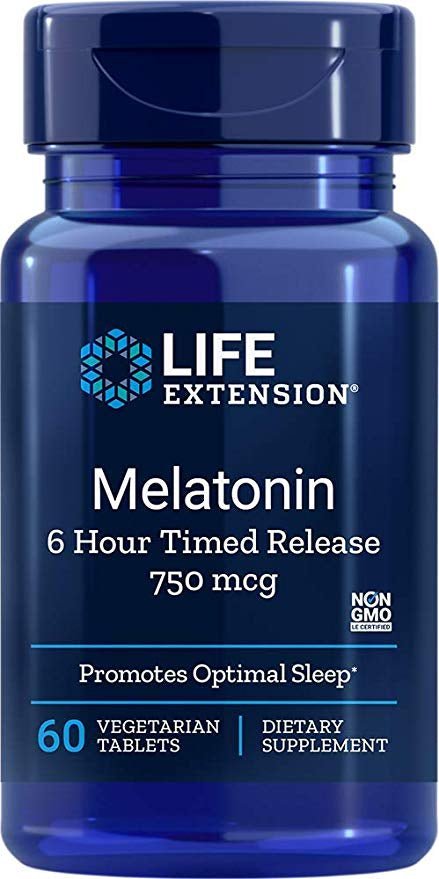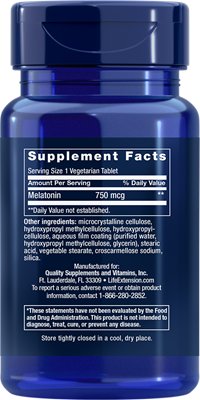Melatonin 6 Hour Timed Release
Melatonin 6 Hour Timed Release Black is backordered and will ship as soon as it is back in stock.
Melatonin 6 Hour Timed Release - 750 mcg, 60 Vegetarian Tablets
Description: Melatonin is a natural hormone that promotes sleep by regulating the body's circadian rhythm. It is known to contribute to falling asleep faster, but also has a number of health benefits beyond sleep quality. This supplement provides a low dose (750 mcg) of melatonin that is released gradually over a period of six hours, helping to both fall asleep and stay asleep through the night. The time-regulated release ensures a stable level of melatonin in the body, which can be particularly useful for those who experience occasional insomnia or have difficulty maintaining a good circadian rhythm.
Advantages and effects:
- Promotes optimal sleep quality: This formulation ensures a gradual release of melatonin over six hours, which helps to improve both falling asleep and the duration of sleep.
- Supports healthy circadian rhythm: Melatonin helps to regulate the body's natural sleep-wake cycle, and can be useful for people affected by jet lag, shift work or an age-related reduction in melatonin production.
- Strengthens the immune system: Research has shown that melatonin supports the immune system by promoting a balanced immune response.
- Protects against oxidative stress: Melatonin acts as a powerful antioxidant, helping to protect cells' DNA and mitochondria from damage caused by free radicals.
- Supports cognitive health: Melatonin has been shown to support healthy brain function and may promote cognitive health, especially in old age.
How does melatonin work? Melatonin is produced naturally in the pineal gland from the amino acid tryptophan, with main production at night when it is dark. Melatonin production decreases with age and is affected by exposure to light in the evening, which can disrupt the body's natural sleep pattern. Supplementation of melatonin helps restore normal circadian rhythms, promote falling asleep and improve sleep quality.
Melatonin and sleep: Good sleep is essential for general health and well-being. Melatonin plays a key role in promoting sleep by signaling to the body that it is time to rest. Studies have shown that supplementing with melatonin can contribute to better sleep, especially in people with disturbed sleep patterns.
Melatonin and oxidative stress: Melatonin is also known for its powerful antioxidant properties. It helps inhibit oxidative damage to cells and has been found to be more effective than many other antioxidants in protecting cellular DNA and mitochondria from damage.
Melatonin and the immune system: Melatonin can also help modulate the immune system by stimulating immune response when needed and dampening overactive reactions. This makes melatonin an effective supporter of immune health.
Ingredients:
- Melatonin (750 mcg per tablet)
- Microcrystalline cellulose
- Hypromellose
- Water-soluble coating (purified water, hypromellose, glycerin)
- Stearic acid
- Vegetable stearate
- Sodium carboxymethylcellulose (E466)
- Silicon dioxide (SiO2)
Dosage and use: Take one (1) tablet 30 to 60 minutes before bedtime, or as recommended by a healthcare professional. For the best possible effect, melatonin should be taken in the evening when the body naturally begins to produce the hormone.
Precautions:
- Consult a doctor before use if you are being treated for a medical condition (especially autoimmune or depressive disorders).
- Avoid alcohol when taking melatonin.
- Not recommended for children, pregnant or lactating women.
- Do not drive or operate heavy machinery after taking melatonin.
- Keep out of the reach of children.
- Do not exceed the recommended dosage.
Disclaimer: This product is not intended to diagnose, treat, cure or prevent disease. All use of dietary supplements is at your own risk and should be done in consultation with a doctor. The recommended daily dose should not be exceeded. Dietary supplements should not replace a varied diet. Keep out of the reach of children. Uno Vita AS does not claim that the products we market can cure disease. The information here is intended as a guide only and is not a substitute for professional medical advice.
Freedom of expression and right to information: Uno Vita reserves the right to share publicly available research and information on health and wellness technologies, natural substances, vitamins and the like. We do this with reference to national and international laws on freedom of expression and belief.
References:
- Reiter RJ, Tan DX, et al. "Melatonin as an antioxidant: biochemical mechanisms and pathophysiological implications in humans." Acta Biochimica Polonica. 2007.
- Galano A, Tan DX, Reiter RJ. "On the free radical scavenging activities of melatonin's metabolites, AFMK and AMK." Journal of Pineal Research. 2013.
- Hardeland R. "Melatonin and the theories of aging: a critical appraisal of melatonin's role in anti-aging processes." Journal of Pineal Research. 2012.
- Carrillo-Vico A, Lardone PJ, et al. "Melatonin's dual role as an anti-inflammatory and antioxidant in the aging brain." Neuroscience Letters. 2013.
- Cardinali DP, et al. "Melatonin effects on immune responses: its role in diseases and as a therapeutic agent." Journal of Pineal Research. 2003.
- Acuña-Castroviejo D, et al. "Melatonin-mitochondria interplay in health and disease." Current Topics in Medicinal Chemistry. 2011.
- Pandi-Perumal SR, et al. "Role of melatonin in the regulation of human circadian rhythms and sleep." Journal of Pineal Research. 2007.
- Claustrat B, Brun J, et al. "Melatonin and aging: physiological and therapeutic perspectives." Neuroendocrinology Letters. 2005.
- Zisapel N. "Melatonin-dopamine interactions: from basic neurochemistry to a clinical setting." Progress in Neurobiology. 2010.
- Reiter RJ, et al. "Melatonin as an anti-aging, antioxidant and anti-inflammatory agent." Endocrine Journal. 2008.
- Videnovic A, et al. "Circadian and sleep dysfunction in neurodegenerative disorders: role of melatonin." Journal of Clinical Sleep Medicine. 2014.
- Korkmaz A, Reiter RJ, et al. "Melatonin and cognitive function in the elderly." Journal of Clinical Sleep Medicine. 2011.








